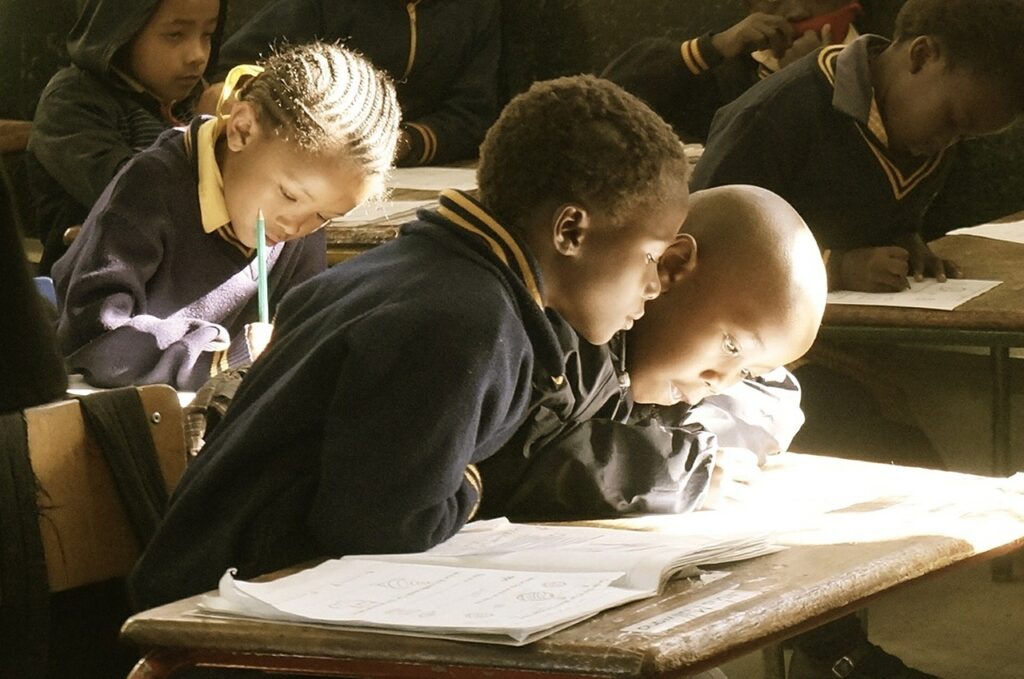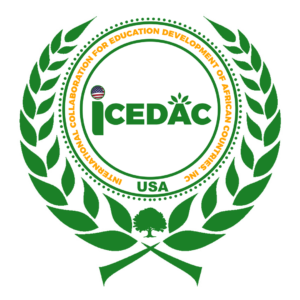OUR VISION
IN TERMS OF EDUCATION
By Dr. HANS Stevy

Our vision is of a world where the right to education is a reality for all, from early childhood to adulthood and throughout life, based on the principles of non-discrimination and equality. A world where education is recognized as a human right, in law and in practice, and where all human rights in and through education are realized. A world where states and non-state actors are held accountable for their respective obligations and responsibilities; and where civil society is empowered to play its sheriff’s ball in monitoring its implementation.
Our fight for access to quality education for all is essential because, without education, no social, economic, political or health progress is possible. Investing in education is therefore essential for the future of a country, a continent and the planet.
Worldwide, 258 million children and young people do not attend school. For those who do go to school, the education provided is such that it does not enable them to acquire basic skills. 617 million children today cannot read a simple sentence, even for those (64%) who have spent at least 4 years in school (Global Monitoring Report on Education, UNESCO, 2018). From this observation, a major cause follows, namely: The shortage of teachers, or even untrained, they work in more than difficult conditions, without suitable resources and in often overcrowded classes that can sometimes be as many as a hundred children per class.
According to UNESCO, the world will need 68.8 million teachers by 2030 to give every child access to primary and secondary education. In light of these alarming global figures, ICEDAC USA has decided to take action to promote quality education with equal access for all, especially for vulnerable and marginalized populations.
For ICEDAC-USA, the construction of a free and inclusive education, with qualified teachers and appropriate pedagogical content, is a prerequisite for the realization of the right to education for all, which will help reduce the number of school dropouts, eliminate discriminatory gaps in basic learning between individuals, and provide everyone with the skills needed for daily life, professional success and individual fulfillment.
Did you know that a child under the age of 5 is twice as likely to survive if its mother can read and write? That if all children in low-income countries could read, poverty would fall by 12%? That an extra year of schooling can increase men’s income by at least 10% and women’s by at least 20%? That equal access to education for girls and boys reduces the risk of violent conflict by 37%? Education is therefore the most powerful asset for bringing about significant improvements in health, stimulating economic growth and encouraging the development of more resilient and sustainable societies. For ICEDAC-USA, education is the golden thread of development.
Without quality, inclusive and equitable education, countries will be unable to break the cycle of poverty. Making the right to education effective for all is therefore a matter of the utmost urgency.
Convinced of the importance of free, inclusive education, with qualified teachers and appropriate pedagogical content, ICEDAC USA has decided to develop projects to convince communities of the importance of quality education accessible to all. The projects will involve improving school management and environment, teacher training and educational content. All our actions contribute to increasing school attendance, improving student results and performance, and reducing the number of school dropouts.
ICEDAC-USA attaches great importance to girls’/women’s education: A girl deprived of education is deprived of her fundamental rights. A girl deprived of education is deprived of her fundamental rights, relegated to household chores and exposed to pregnancy, early marriage and dependency. Guaranteeing all girls and women access to quality education is therefore essential to respecting their rights and accelerating the construction of a fair and sustainable world.
ICEDAC-USA is mobilizing to ensure access to education for all girls and women, particularly in countries where women’s rights are not respected. More generally, it’s an essential part of the fight against gender discrimination throughout the world.
Discrimination and violence against girls and women is an emergency situation. Girls and women are very often confronted with multiple forms of discrimination and violence from birth: 130 million girls worldwide do not attend school (UNESCO, 2018); 12 million young girls are married at an early age (UNESCO, 2019); 18.5 million girls, aged 15 to 19, give birth to a child (UNESCO, 2019). COVID-19, like all crises, has further worsened the situation of young girls worldwide, both in terms of educational inequalities and the deprivation of their freedoms: More than 11 million additional girls are at risk of not returning to school (UNESCO, 2020); More than 10 million additional early marriages are expected in the next ten years (UNESCO, 2021); The number of female genital mutilations could increase by 2 million over the next decade (UNESCO, 2021).
For ICEDAC-USA, girls’ and women’s education is so important because an educated girl acquires the life skills and know-how to be an active and committed citizen, to defend her rights, to choose a job, to be financially independent and to take better care of herself and her children.
Women’s education is a perpetual battle, and the gains made remain fragile, whatever the region. Inequalities between men and women in education persist, but actions such as those carried out by ICEDAC-USA are essential to empowering women.
To promote education for girls and women, ICEDAC-USA is committed to giving priority to the most vulnerable populations, especially girls and women.
ICEDACUSA’s leitmotiv is that they should acquire knowledge throughout their lives, so that they can be masters of their own development, autonomous and agents of change.
Since education is the key to progressively eradicating all forms of gender-based violence against women, such as forced marriage, early pregnancy and other forms of abuse that are still all too widespread today, upholding women’s rights through education is becoming a pillar of women’s emancipation.
To achieve this mission :
ICEDAC-USA works, among other things, to:
Deconstructing gender stereotypes;
Raising community awareness of the importance of girls’ rights, and encouraging young girls to respect their rights.
Educating girls and women: once educated, they can become agents of change within their communities and bring about behavioral change.
The drafting of educational content to promote gender equality from the earliest age: changing norms from the earliest age is the key to success for generations to come. Early childhood education must therefore be based on parity.
The projects that ICEDAC USA proposes to women who have been deprived of an education are of dual interest: Literacy and socio-professional training with support for entrepreneurship.
This training enables them to acquire skills, gain self-confidence and access better economic opportunities. In the long term, it can transform cultural traditions in terms of gender and reverse the prevailing distribution of power.
Access to quality education must be possible throughout life, including for people who have not received basic education.
Vocational training being the learning process that enables an individual to acquire the knowledge, know-how and interpersonal skills needed to exercise a trade or professional activity, it is with this in mind that ICEDAC-USA is developing training and socio-professional integration projects in the countries where it operates, aimed at the most disadvantaged young people and women.
Lifelong education is essential for all social strata, but 250 million young people worldwide, or 1 in 5, are out of school, without training, diplomas or qualifications (ILO, 2019). They therefore have no means of making a living, supporting their families or integrating socially. 773 million adults, two-thirds of whom are women, can neither read nor write, and find it difficult to find employment.
The literacy, training and socio-professional integration programs offered by ICEDAC-USA will reinforce the know-how and interpersonal skills needed to exercise a trade or professional activity, enabling everyone to benefit from a second chance and build a fairer, more prosperous future.
ICEDAC USA wants to help build a world where everyone has the opportunity to develop their full potential through access to quality education and learning.
ICEDAC-USA is in the process of developing a major training and socio-professional integration program to be launched in the countries where we are already active.
Our training and professional integration program will offer young people, aged between 18 and 30, who have at least completed elementary school, the chance to follow rapid 12-month training courses leading to qualifications in fields as varied as sewing, aesthetics, mechanics, hotel service, tourism, accounting, IT and many others.
We also offer training in self-employment, enabling young people to seize their chance and develop their own business.
Our program is aimed much more at women.
In just a few months, it teaches them skills and know-how, and offers them personal coaching to give them confidence and the desire to act.
In the long term, it helps to transform cultural gender traditions and reverse the prevailing distribution of power.
In sub-Saharan Africa, for example, a third of girls aged between 15 and 19 have at least one child. Stigmatized and rejected by society, they find themselves destitute. ICEDAC USA is in the final stages of developing a vocational training project for 1,000 of them in each country where we operate.
Over a 3-year period, these girls will receive psychosocial support to regain their self-confidence, learn about gender-based violence, and receive vocational training.
